Medical expert of the article
New publications
Preparations
Effective syrups for bronchitis: cough syrups, expectorants, on herbs
Last reviewed: 04.07.2025

All iLive content is medically reviewed or fact checked to ensure as much factual accuracy as possible.
We have strict sourcing guidelines and only link to reputable media sites, academic research institutions and, whenever possible, medically peer reviewed studies. Note that the numbers in parentheses ([1], [2], etc.) are clickable links to these studies.
If you feel that any of our content is inaccurate, out-of-date, or otherwise questionable, please select it and press Ctrl + Enter.
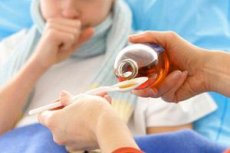
Bronchitis, as one of the types of inflammatory pathologies of the respiratory system, is simply impossible to imagine without a cough. And, despite the fact that even this word alone makes a person cringe under the weight of unpleasant, painful memories, the cough itself often brings more benefit than harm. Thanks to it, the bronchi are cleared of pathogenic bacteria, viruses and their waste products, which are united by the general concept of "phlegm", and syrup for bronchitis helps to get rid of it quickly, preventing further development of inflammation.
Indications for use
In principle, cough suppressants or mucolytic tablets can also help with coughs caused by inflammatory diseases of the upper and lower respiratory tract. However, many doctors agree that syrup for bronchitis and other respiratory pathologies accompanied by dry or wet coughs works faster and more effectively. In addition, this form of the drug is suitable for treating not only adult patients, but also children, who find it easier to swallow a sweet, aromatic semi-liquid mass than a tasteless or bitter hard tablet.
A large selection of drugs in the form of syrup helps to choose a medicine that is effective at different stages of inflammatory disease of the bronchi, taking into account the nature of the existing cough. This is a very important point in the treatment of bronchitis, requiring a professional approach, so syrups, like other drugs, should be prescribed by the attending physician. An incorrectly selected drug can only worsen the patient's condition.
The disease in the vast majority of cases begins with a dry, painful, barking cough, accompanied by a burning sensation and pain in the chest. The peak of coughing attacks occurs in the evening, due to which the sleep-wake cycles are disrupted.
Dry cough is often called unproductive, since all attempts to cough up the too viscous sputum accumulating in the bronchi are unsuccessful. To remove thick mucus from the bronchi, mucolytics (drugs that thin sputum) are used. At this stage of the disease, they are most relevant.
When the disease moves to the next stage, the cough changes its character. It becomes wet, with the release of sputum, which subsides by the evening and brings many unpleasant minutes in the morning. Alas, what we call sputum is in fact nothing more than mucus (sometimes with an admixture of pus or blood), which means that coughing it up is not so easy. But leaving this bacterial-viral component in the body is very dangerous, because it will contribute to the spread of inflammation deep into the respiratory tract and cause such severe pathologies as bronchopneumonia and pneumonia.
At this stage, mucolytics can be used only in case of difficult cough with a small amount of viscous sputum. If there is already enough mucus secreted, sputum-thinning drugs can provoke a condition when a person simply will not have time to cough it up and spit it out.
In this case, drugs of a different type are indicated - expectorant syrups, which in case of bronchitis will help remove phlegm from the respiratory tract, not so much by increasing its quantity, but by stimulating a productive cough due to contractile movements of the bronchial walls. In this way, it is possible to prevent stagnation of mucus in the respiratory tract.
A syrup for obstructive bronchitis, when in addition to a wet cough there is also difficulty breathing due to tissue edema and spasm of the bronchial walls, should also have an expectorant effect. However, preference should be given to drugs with a double, or better yet, triple effect: liquefaction of sputum, stimulation of its expectoration and anti-inflammatory effect.
In general, anti-inflammatory syrups for bronchitis are indicated both at the early stage of the disease and in its full swing. After all, they help not only remove phlegm from the bronchi, but also reduce such symptoms of inflammation as swelling and spasms, which prevent oxygen from freely and in sufficient quantities penetrating into the lungs, and from them into other organs in need.
In chronic bronchitis, which reminds of itself for several years with rather long painful coughing fits, syrups are prescribed with an antitussive effect. Chronic course of the disease is often observed in smokers, people living or working in unfavorable environmental conditions, allergy sufferers. In this case, little sputum is secreted or it is absent altogether. Syrups in this case are used for symptomatic treatment of painful cough in order to alleviate the general condition of the patient.
Cough syrups are also effective in combating residual cough, which in bronchitis can torment the patient a month or more after recovery. They are prescribed only if the infectious process has not spread to the lower respiratory tract, in particular to the lungs.
Cough syrups should not be used for obstructive bronchitis and inflammatory pathologies of the lower respiratory tract, since they will only provoke congestion in the respiratory system. Only drugs that facilitate the discharge of sputum by reducing its viscosity, stimulating its expectoration, but in no way stopping the cough, can alleviate the patient's condition.
Pharmacodynamics
As we can see, with bronchitis, depending on the nature of the pathological process and the degree of its development, the doctor can prescribe completely different drugs (syrups and tablets), which will differ not only in the active substance, but also in their effect on the patient's body.
Thus, phlegm thinners used to transform a dry cough into a productive one only change the nature of the mucus, making it less viscous, due to which it is easily removed from the bronchi (sometimes even without coughing). Taking such drugs must be combined with drinking a large amount of liquid. Due to this, there is more phlegm, and its structure is less viscous.
These drugs affect the protein structure of mucous secretions, destroying the bonds in it, due to which the sputum becomes closer to liquid than to viscous mucus. Due to the water drunk, there is even more sputum, which means that a dry, straining cough turns into a profuse productive cough, which promotes the active removal of viruses and bacteria from the body.
Expectorant syrup for bronchitis acts differently. It relieves cough by enhancing the cough reflex. The active components of such drugs correct the characteristics of sputum, enhance the peristalsis of the bronchioles, improve the motility of the bronchial walls and the condition of the mucous membrane. In some cases, they also have a stimulating effect on bronchial receptors, as well as on the glands of the oral cavity and stomach, due to which their secretion increases slightly.
The pharmacodynamics of antitussive drugs is based on reducing the irritating effect on the cough center and suppressing the cough reflex.
The difficulty of choosing syrups for bronchitis on your own is that there are very, very few drugs that have any one of the above-mentioned effects. Modern effective drugs have a complex effect on the body: expectorant and anti-inflammatory, mucolytic and expectorant, bronchodilator (expands the lumen of the bronchi) and antiviral, etc.
Often, in the instructions for the drug, you can see several useful actions that may even seem mutually exclusive to a person ignorant of medical issues. This means that it is always better to entrust the decision on choosing an effective drug to a professional, i.e., the attending physician.
Names and descriptions of syrups recommended for bronchitis
The information in this section of the article should be used only for the purpose of familiarizing yourself with various medications, their effects, and the specifics of their use, but not for independently prescribing one or another syrup for bronchitis and other inflammatory pathologies of the upper and lower respiratory tract.
Althea syrup
The main active ingredient of the drug is marshmallow root, which has expectorant and anti-inflammatory effects.
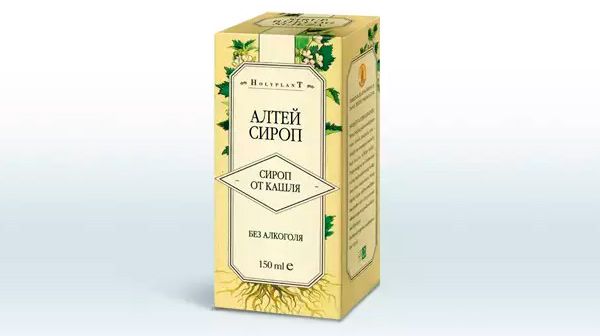
Composition and form of release. In addition to the extract from the root of the marshmallow, the syrup contains purified water, sucrose and sodium benzoate.
The syrup is quite transparent with a brown tint and a smell inherent to the plant in its composition, has a thick consistency. It is packaged in bottles and jars made of dark glass. The volume of the preparation in the container is 125 or 200 g. Glass containers are packed in separate cardboard boxes.
Indications for use. The drug is intended for the treatment of inflammatory pathologies of the respiratory system. It is prescribed if the disease is accompanied by a cough with viscous sputum, for example, with bronchitis, tracheitis, laryngitis and other diseases.
Contraindications for use. The drug is not prescribed for the following pathological conditions:
- hypersensitivity to the active substance or auxiliary components of the drug,
- sucrose isomaltase enzyme deficiency,
- negative reaction of the body to fructose,
- glucose-galactose malabsorption.
Side effects. Due to hypersensitivity to the components of the drug, allergic reactions often develop.
Use during pregnancy. The syrup can be used to treat bronchitis in pregnant women. But this should be done after consulting a doctor who can take into account all the risks associated with taking the medicine.
Method of administration and dosage. Althea syrup for bronchitis in adults and children over 12 years old is indicated in a single dosage - 1 tbsp. syrup per ½ liter of water. For children under 12 years old, 1 tsp. of the preparation is diluted in a glass of water.
The water should be warm and the medicine should be taken after meals. The frequency of administration in both cases is 4 to 5 times. The course of treatment is usually limited to 2 weeks.
Overdose. Taking syrup in large doses may cause nausea and vomiting, which requires immediate discontinuation of the drug and gastric lavage.
Interaction with other drugs. The instructions for the drug indicate that it cannot be taken in parallel with antitussives, especially if they contain codeine. Such therapy will not produce results, since the drugs will cancel each other out.
Storage conditions. The drug is stored at room temperature, not exceeding 25 degrees, in a place protected from sunlight. Keep out of reach of children.
Shelf life. When stored properly, the syrup retains its properties for 1.5 years.
Althea syrup
It is considered an analogue of the above-described drug with the same components. It increases the production of bronchial secretions, reduces their viscosity and facilitates their removal, envelops the walls of the bronchi, preventing their irritation when coughing, has an anti-inflammatory and regenerating effect.
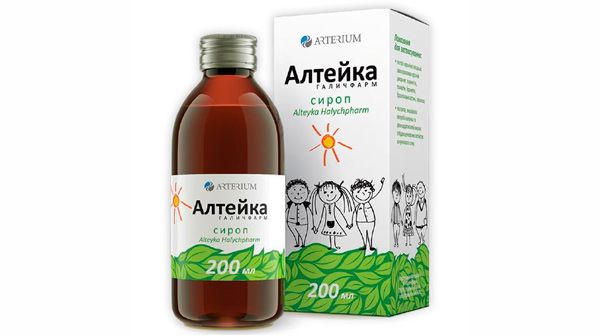
Release form. Transparent reddish-brown or yellowish-brown syrup is sold in dark bottles or jars of 100 and 200 ml, placed in a cardboard container together with a measuring spoon, which is very convenient for dosing.
The drug has the same contraindications as marshmallow syrup. It is used for therapy of adults and children over 2 years old.
Side effects include: increased salivation, irritation of the gastrointestinal mucosa, allergic symptoms.
Method of administration and dosage. For the treatment of adults and adolescents over 14 years of age, a single dose of the drug will be 15 ml, for children 6-14 years old - 10 ml, for children 2-6 years old - 5 ml of syrup.
You need to drink the syrup before meals 4 to 6 times a day for 1-2 weeks.
The shelf life of the drug at room temperature is 3 years. After opening the bottle, it is stored on the bottom shelf of the refrigerator for no more than 2 weeks.
Gedelix syrup
An equally popular herbal preparation that thins mucus and at the same time has an expectorant and antispasmodic effect. It is also credited with wound healing, antioxidant and anti-inflammatory effects, as well as some antifungal and antibacterial effects.
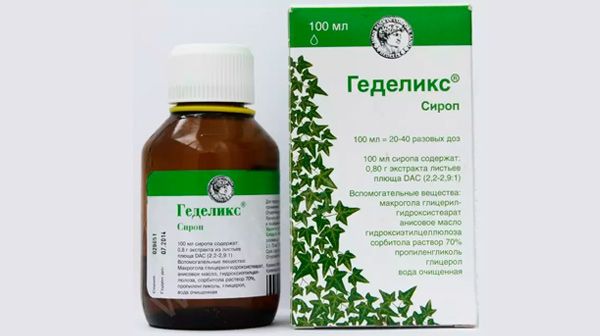
The active substance of the drug is ivy leaf extract. Glycerol, anise oil, macrogol, propylene glycol, water, sweetener (sorbitol) are present in the syrup as auxiliary agents. As we can see, the drug does not contain alcohol or sugars, which allows it to be used to treat patients with enzyme deficiency and diabetes.
Release form. Transparent syrup with a pronounced yellowish-brown tint is sold in glass dropper bottles (volume 100 ml), placed in cardboard boxes together with a 5 ml measuring spoon.
Indications for use. The drug is prescribed to patients with acute or chronic infectious and inflammatory pathologies of the respiratory organs, one of the symptoms of which is a dry cough.
Contraindications for use. The medicine in syrup form is not usually prescribed for bronchial asthma, enzyme deficiency of arginine, high probability of respiratory spasm, as well as hypersensitivity to the components of the drug.
Use during pregnancy. The drug is not recommended for use in pregnant women and nursing mothers.
Side effects. Quite often there are nausea accompanied by vomiting, diarrhea, allergic reactions. Sometimes patients complain of pain in the epigastrium.
Method of administration and dosage. Syrup "Gedelix" for bronchitis in an adult or a child over 10 years old is recommended to be taken undiluted after meals. Frequency of administration - 3 times a day. Single dose - 5 ml of syrup.
A single dose for children (from birth to 10 years) is 2.5 ml. Children from 4 to 10 years old take the medicine 4 times a day, children 1-4 years old - three times a day, newborns and children up to 12 months - 1 time per day. In this case, it is recommended to dilute the syrup in warm water (approximately 1/2 cup).
The course of treatment usually lasts from 7 to 10 days.
Overdose. Increased side effects (diarrhea, nausea with vomiting, stomach pain) are observed, nervous excitement is noticeable.
Treatment of the condition consists of gastric lavage and symptomatic treatment.
Interaction with other drugs. "Gedelix", like other expectorant drugs, is not recommended to be taken simultaneously with drugs that suppress cough.
Storage conditions. It is recommended to store the syrup in a room with room temperature and limited access to sunlight.
Shelf life. The drug can be stored and used (subject to appropriate storage conditions) for 4 years. After opening the bottle, the syrup retains its properties for six months.
Syrup "Erespal"
This is a slightly different drug. "Erespal" syrup has anti-inflammatory, antispasmodic and even antihistamine action, which is why it is indicated not only for bronchitis and other infectious and inflammatory diseases of the respiratory system and ENT organs, but also for bronchial asthma as part of a comprehensive treatment of the disease. The active substance is fenspiride.
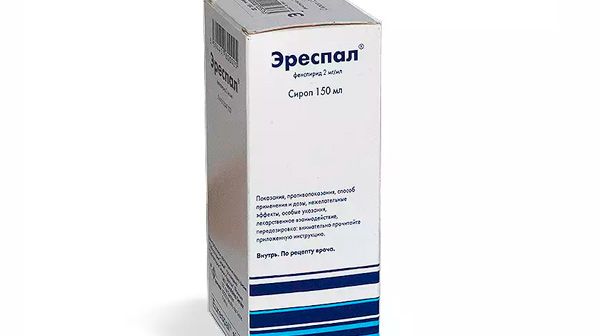
Pharmacodynamics. The syrup prevents obstruction of the bronchi (bronchoconstriction) and bronchospasm, reduces the formation of exudate in the respiratory tract, inhibits the production of bronchial secretions. It is especially useful in obstructive bronchitis.
Pharmacokinetics. It is rapidly absorbed when taken orally. The maximum concentration of fenspiride in the blood is observed after 2-2.5 hours. The half-life of the drug is 12 hours. It is excreted mainly by the kidneys, and only about 10% is excreted with feces.
Release form. Transparent orange syrup is sold in plastic bottles of 150 ml. Each bottle is packed in a separate cardboard container.
Contraindications for use. The drug is not prescribed in case of hypersensitivity to at least one of its components. In pediatrics, it is not used to treat children under 2 years of age.
The syrup contains the sweetener sucrose, therefore therapy of patients with diabetes mellitus, fructose intolerance, glucose-galactose malabsorption, isomaltase and sucrase deficiency should be carried out with special caution with monitoring of blood sugar levels.
Side effects. Taking oral medications such as Esperal tablets and syrup is often accompanied by gastrointestinal disorders. This usually manifests itself in stomach pain, nausea and vomiting, and decreased stool frequency.
Less common are disorders of the cardiovascular system (tachycardia with high doses of the drug), central nervous system (dizziness and drowsiness, increased fatigue), and skin (various rashes on the body, itching, erythema).
Use during pregnancy. There is insufficient data on the effect of the drug on the course of pregnancy and fetal development, so if possible, respiratory therapy during pregnancy and lactation should be performed with proven, safe drugs.
Method of administration and dosage. The syrup should be taken before meals. The daily dosage for adults and adolescents over 12 years of age ranges from 45 to 90 ml (3-6 spoons).
For children over 2 years old, the dose is prescribed depending on the patient's weight (4 mg per 1 kg of body weight per day). If the child weighs less than 10 kg, the dosage of the drug will be from 10 to 20 ml per day.
It is recommended to divide the daily dose into 2-3 doses. The duration of the therapeutic course is determined by the attending physician.
Overdose. Symptoms: drowsiness or increased excitability, tachycardia, dyspeptic symptoms, bowel disorders.
Treatment: gastric lavage, ECG monitoring, symptomatic therapy. In severe cases, it is recommended to contact a medical facility.
Interaction with other drugs. It is not recommended to take it simultaneously with sedatives.
Storage conditions. The preparation perfectly retains its properties at room temperature.
Shelf life. The syrup can be stored for 3 years.
An analogue of the above-described drug is Inspiron syrup, which is used to treat patients aged 3 years and older.
Licorice syrup
Licorice root syrup is a fairly popular remedy prescribed for acute and chronic bronchitis, pneumonia, and inflammatory diseases of the ENT organs. It is not an alcohol-based composition, but a water-based one, which means it can be used to treat both adults and children.
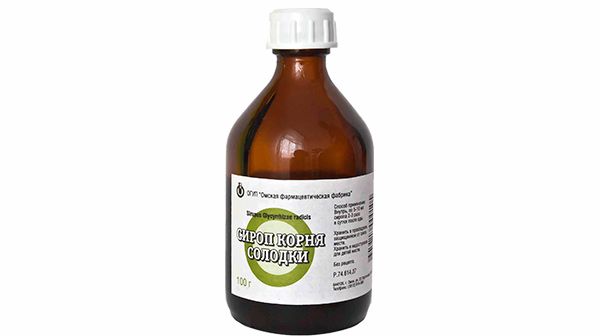
Pharmacodynamics. The drug belongs to the group of expectorants. It also has the ability to thin sputum, facilitating its discharge. Licorice root extract and auxiliary components provide the drug with some antispasmodic and anti-inflammatory effect.
Release form. The syrup is a viscous liquid mass with a brown tint and a distinct taste. It is sold in containers of 50, 100 and 200 ml, packed in cardboard boxes with a dosing spoon.
Contraindications for use. Restrictions on the use of the drug are related to the properties of licorice root. Thus, the syrup is not prescribed if the patient, in addition to infectious and inflammatory diseases of the respiratory system, accompanied by a cough with viscous sputum, suffers from liver and kidney pathologies with impaired functioning, hypokalemia, hypertension, obesity of 3-4 degrees. It is prohibited to use this drug in case of hypersensitivity to its components.
The syrup contains sucrose, which means that in case of diabetes mellitus and carbohydrate metabolism disorders the drug should be used with special caution, monitoring blood sugar levels.
Use during pregnancy. Licorice has the property of influencing the synthesis of estrogens and causes hormonal imbalance, which is extremely undesirable during pregnancy. Therefore, the drug is extremely undesirable to use during pregnancy and breastfeeding.
Side effects. Usually, adverse reactions during therapy with licorice syrup occur due to hypersensitivity to the drug (allergic reactions in the form of reddening of the skin, rashes and itching on it) or the use of large doses of the drug for a long time (impaired water-electrolyte balance, hypokalemia, edema syndrome, increased blood pressure, myopathy and myoglobinuria).
Method of administration and dosage. Doctors recommend taking the syrup after meals. The frequency of administration is 3 to 4 times a day. There is no need to dilute the medicine with water, it is enough to wash it down with water in a small amount.
The dose for adults and adolescents from 12 years is 45-60 ml per day. Children 10-12 years old can take the drug in a dosage of 22.5 to 40 ml per day. Children from 4 to 9 are prescribed from 7.5 to 22.5 ml per day, and for very young children (1-3 years old) the daily dose should not exceed 20 ml.
Overdose. With prolonged therapy with the drug and taking large doses, symptoms similar to the side effects of this drug may appear. Treatment is aimed at relieving unpleasant symptoms.
Interaction with other drugs. One of the side effects of licorice syrup is a violation of the water-electrolyte balance. This condition can be caused not only by drug abuse, but also by taking it in parallel with certain types of drugs: thiazide and loop diuretics, laxatives, corticosteroids, cardiac glycosides and some drugs that regulate the heart rhythm. It is necessary to notify the attending physician in advance about the use of the above drugs.
Storage conditions: The medicine should be stored at room temperature below 25 degrees in a dark place.
Expiry date. The syrup retains its properties in a closed package for 2 years. If the bottle has been opened, it can be used within six months.
A brief overview of other effective syrups for bronchitis
The choice of the right syrup for bronchitis depends entirely on the attending physician. And the doctor does not always lean towards widely advertised and popular medications, because there are a great many cough syrups, which means you can always choose the one that will show the best result in each specific case.
Here, for example, is the syrup "Bronchomax", which in terms of its active substance can be considered an analogue of the drug "Erespal". It has all the same properties, indications and contraindications, but it contains banana flavoring, which will certainly appeal to small patients who are already 2 years old. The medicine is available in 100 and 200 ml bottles. It can be used for 3 years.
The mucolytic and expectorant drug "Ambroxol", known to many, is also available as a syrup with a wide variety of flavors (apricot, raspberry, orange, menthol), sweetened with saccharin and sorbitol. The drug perfectly liquefies and removes phlegm, softening the cough.
Its effect lasts for more than 10 hours. The active substance (ambroxol hydrochloride) easily penetrates into the lung tissue and its maximum concentration in the blood is noted after 2 hours after oral administration. It is excreted mainly by the kidneys. It is intended for the treatment of wet cough only.
The syrup is not prescribed to patients with increased sensitivity to the drug and hereditary fructose intolerance. It is not used to combat dry cough. The drug is well tolerated by most patients. During pregnancy, it is not recommended to take the drug in the first trimester.
Children over 12 years of age and adults take the syrup in a single dose of 10 ml three times a day. After 3 days, the dosage is reduced to 5 ml 3 times a day. Children aged 6-12 years take the drug 2 times a day, 5 ml, children aged 2-6 years - 2.5 ml 3 times a day. Children under 2 years of age are prescribed syrup in a single dose of 2.5 ml with a frequency of administration 2 times a day.
Ambroxol is able to enhance the effect of antibiotics, which makes it possible to use them together in bacterial infections.
An analogue of "Ambroxol" with the same active ingredient is the well-known syrup "Lazolvan".
Bronchomed syrup belongs to the category of herbal preparations with a rich medicinal composition (ginger, cinnamon, basil, nutmeg, sarcostema, calotropis, etc.). It fights all types of cough, facilitates breathing and sputum removal, relieves fever and runny nose.
The drug is not used in case of serious gastrointestinal diseases, cough against the background of eosinophilia, problems with glucose and carbohydrate metabolism, hypersensitivity to the components of the drug, alcoholism. In pediatrics, it is used from 6 years of age.
The syrup is incompatible with alcohol. Side effects are observed when contraindications for use are ignored.
Doctors recommend taking the medicine 4 times a day, diluting it in half a glass of warm water (for children, the drug is diluted in 50 ml of water).
A single dose for adults and adolescents over 14 years of age is from 5 to 10 ml, for children – 2.5 ml.
The drug can be used with antimicrobial agents, but not with alcohol-containing solutions and narcotic substances. It can be used for 3 years.
Gerbion syrup is another herbal preparation based on plantain and mallow extract with sucrose, ascorbic acid and orange oil. According to the instructions for the preparation, it has an expectorant, antibacterial and immunostimulating effect. Mallow extract is able to suppress the cough reflex, which is necessary for dry cough, and plantain, in turn, promotes the production of bronchial secretions and cleansing the bronchi of viscous, difficult-to-separate masses.
The drug is intended for the treatment of patients aged 2 years and over. Its use in infancy is limited. The drug is not prescribed for hypersensitivity to the components of the drug, during pregnancy and breastfeeding. It is undesirable for patients with diabetes mellitus and glucose metabolism disorders to take the syrup.
Side effects of the drug are limited to allergic reactions due to intolerance to some components of the drug.
Plantain extract syrup is taken orally with warm water. The frequency of administration is 3-5 times. A single dose of the drug for adults and adolescents from 14 years old is 10 ml of syrup, for children 2-14 years old - from 5 to 10 ml. Children are given the drug no more than 3 times a day.
The syrup is not used simultaneously with other drugs that have the ability to suppress the cough reflex.
The drug can be stored and used in syrup form for 2 years.
Pertussin syrup is a herbal preparation based on thyme extract. It can enhance the secretion of bronchial glands and reduce the viscosity of sputum, stimulates expectoration of mucus secreted, and facilitates breathing.
The drug is not prescribed for hypersensitivity to the components of the drug, heart failure in the decompensation stage, low blood pressure, vascular atherosclerosis, anemia, kidney pathologies, diabetes mellitus, alcoholism. Do not use in the 1st trimester of pregnancy and during lactation. In pediatrics, it is used to treat children over 3 years old.
A single dose of the drug for patients over 12 years of age is 15 ml, for children over 9 years of age – 10 ml, for children over 6 years of age – 5 ml, for children under 6 years of age – 2.5 ml.
The medicine should be taken 3 times a day. Children are recommended to dilute it in 20 ml of warm water.
The drug can be purchased in 50 and 100 ml bottles. It can be stored for no more than 4 years.
Stoptussin syrup is a synthetic drug based on butamirate citrate and guaifenesin. It has an effect similar to Herbion syrup. It has a caramel-iris flavor. The syrup is used to treat obsessive dry cough in bronchitis and other acute respiratory pathologies.
Do not prescribe in case of intolerance to the components of the syrup and myasthenia, for the treatment of cough caused by smoking, in the treatment of bronchial asthma and chronic bronchitis. Do not use in the first trimester of pregnancy and during breastfeeding.
Despite the fact that the drug is synthetic, it can be used in pediatrics from the age of 6 months. The optimal dosage is selected depending on the patient's body weight. A single dose for babies weighing less than 12 kg is 1.25 ml. Children weighing from 12 to 40 kg are prescribed 2.5 ml per dose. Adult dosage ranges from 5 to 7.5 ml. The frequency of taking the drug is 3-4 times a day as prescribed by a doctor.
The interval between doses of the medicine should be about 5 hours. Take the syrup after meals, washing it down with a sufficient amount of liquid. The course of treatment should not exceed 1 week.
The syrup is sold in a 100 ml bottle. Shelf life is 4 years.
In case of obstructive bronchitis, the doctor may prescribe the expectorant syrup "Ascoril" based on sulfabutamol, bromhexine and guaifenedin. However, it is not suitable for patients with severe cardiovascular pathologies, hyperthyroidism, ulcerative lesions of the gastrointestinal tract, liver diseases. The syrup can be given to children from 2 years old.
A single dose of the drug for patients over 12 years of age is 10 ml, for children - from 5 to 10 ml. The frequency of administration is 3 times a day.
This medicine has quite a lot of side effects, so it can only be used as prescribed and under the strict supervision of the attending physician.
It can be purchased in 100 and 200 ml bottles. Shelf life is 2 years.
An analogue of the drug "Ascoril" is the syrup "Kashnol".
Syrup "Bronholitin" - a preparation based on glaucine and ephedrine, which has an antitussive and bronchodilator effect. It is used in acute and chronic forms of bronchitis to combat dry cough.
Indicated for use from 3 years. Not prescribed for coronary heart disease, high blood pressure, CHF, pheochromocytoma, thyrotoxicosis, insomnia, prostate adenoma, closed-angle glaucoma, hypersensitivity to the drug. Do not use in the first 3 months of pregnancy and during lactation.
The syrup should be taken after meals. The adult dosage is 10 ml, 3-4 times a day. The children's dosage (age 3-10) is 5 ml, taken three times a day.
It is worth mentioning another interesting drug. "Atma" is not exactly a syrup, but rather homeopathic drops with many useful properties. They thin mucus well, facilitate its passage through the bronchi, strengthen the immune system, have anti-inflammatory and anti-allergic effects. The drops can be used to treat acute and chronic bronchitis, including obstructive, bronchial asthma and chronic asthmatic bronchitis.
The drug is prescribed to patients over 12 years of age who do not have hypersensitivity to the components of the drug (casambucus, sodium sulphuricum, dulcamara, arsenic oxide, emeticus tartarus). During pregnancy and lactation, the drug is used under the supervision of a doctor. It can be used in childhood with a reduced dosage.
Adults are recommended to take 10 drops of drops. The frequency of administration is 3 times a day. The children's dose, depending on age, ranges from 1 to 7 drops. The syrup is diluted in 1 tbsp. of water. Babies are given 1 drop of the medicine, dissolving it in 1 tsp. of warm water.
The therapeutic course can last from 4 weeks to 3 months, depending on the severity of the pathology.
The drug prescribed by the doctor can be stored at room temperature, away from electromagnetic radiation, for 5 years.
These are, of course, not all the existing drugs indicated for the treatment of various types of cough with bronchitis. There are many other fairly effective and safe drugs that a doctor can prescribe to combat cough. But it is always more advisable to entrust the decision to prescribe a particular drug to a doctor, rather than rely on your life experience and the advice of other people far removed from medicine.
Syrup for bronchitis for children
When a child is sick, both parents and doctors approach the treatment of the child with great caution, and therefore choose the safest drugs for the child's body. After reading the descriptions of various syrups used for bronchitis, you can see that almost all drugs can be used in childhood.
In general, this form of medicine can be called childish in a sense. Little ones have great difficulty swallowing hard tablets, but they usually drink sweet liquid syrup (and even with their favorite flavors) with great pleasure.
However, when choosing an effective syrup for bronchitis for a child, it is necessary to take into account not only its composition, taste and color, but also the information from the instructions indicating from what age and in what dosage the syrup can be used to treat children.
Most syrups, both natural and synthetic, are approved for use in children over 2 years of age (Alteika, Esperal, Inspiron, Bronchomax, Ascoril, etc.). However, there are drugs that are recommended for use from 3 years of age (phytopreparations Doctor Mom, Suprema, Bronholitin, etc.). Sometimes a doctor can prescribe such drugs to children under 2-3 years of age, but in this case, he himself sets a safe dosage and monitors the course of the child's treatment.
But the drug "Bronchomed" is recommended for use in treating children no younger than 6 years old. And this must be taken into account before you start stuffing your baby with "adult" drugs.
There are also medications for children in their first year of life. For example, the syrup "Stoptussin" can be prescribed from the age of 6 months, and "Gedelix" is safe from the very birth of the baby. For children in their first year of life, the doctor can also prescribe syrups "Ambroxol", "Lazolvan", "Kashnol".
It is important to understand that good syrups for bronchitis are not those that are widely advertised in the media, but those that are selected in accordance with the diagnosis, type of cough, characteristics of the body and age of the patient.
It is a mistake to think that herbal preparations are less safe than synthetic ones, because they also have their contraindications and side effects. And they are not always limited to skin reactions. In support of this, it is worth noting that the synthetic Stoptussin is allowed to be used for the treatment of babies from 6 months, and herbal preparations Doctor Mom (basil, licorice, turmeric, aloe, ginger and other plants) and Suprema with an identical herbal composition are allowed only from the age of 3.
Selecting an effective drug is an important point in the treatment of patients of any age. The bronchitis syrup prescribed by the doctor should 100% cope with its task without causing harm to the patient's body. This is a great responsibility that should not be shouldered by people who do not have the appropriate medical education. Otherwise, the treatment may result in new torments.
Attention!
To simplify the perception of information, this instruction for use of the drug "Effective syrups for bronchitis: cough syrups, expectorants, on herbs" translated and presented in a special form on the basis of the official instructions for medical use of the drug. Before use read the annotation that came directly to medicines.
Description provided for informational purposes and is not a guide to self-healing. The need for this drug, the purpose of the treatment regimen, methods and dose of the drug is determined solely by the attending physician. Self-medication is dangerous for your health.


 [
[